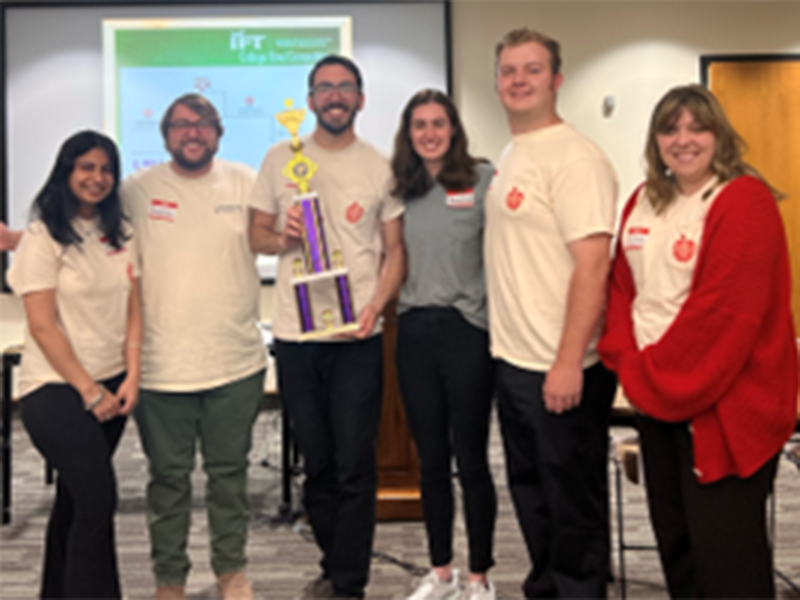
U of A students in food science recently claimed first place in the Institute of Food Technologists Student Association College Bowl South-Central Competition held in Louisiana.
With the IFTSA South Central regional championship, U of A's food science college bowl team earns a spot in the national contest at the IFT Annual Expo in Chicago in July.
The team is made of up food science majors in the Dale Bumpers College of Agricultural, Food and Life Sciences. Members are team captain Bernie Pontes Guimaraes, Chetanjot Romana, Andrew Maust, Amanda Stuber and Cason Frisby.
The group is coached by instructor Morgan Denzer, who also advises the Food Science Club and teaches Introduction to Food Science and Product Innovation for the Food Scientist classes.
"We have been training since last semester, dedicating at least an hour a week to get used to the questions and the kind of competition," Guimaraes said. "We are very fortunate that Dr. Denzer helps us with that. The team performance lies in its diversity, with each individual having a unique background in food science, our ability to work in groups and commitment to the team. We did a great job in the regionals in Louisiana. Now we need to practice for the nationals against the other top seven teams in the country."
"Competing in the college bowl allows me to explore topics that wouldn't traditionally be covered in our degree plan, as well as expand my connections to the food science industry as a whole," Frisby said.
U of A's team won the regional with head-to-head wins over Louisiana State University in the first round, 28-10; Texas A&M University in the second round, 14-8; and Texas A&M again in the finals, 28-4.
"Participating in the college bowl has been an enriching experience that has deepened my knowledge across various subjects of food science and sharpened my critical thinking and problem-solving skills," Chetanjot said. "The collaboration with my teammates has taught me the value of teamwork and the power of working together toward a common goal."
Competition is double-elimination, with each round composed of 20 questions. Every fifth question is a bonus question, with all others considered toss-up questions. The team answering toss-up questions correctly before the next bonus question wins the opportunity to attempt the bonus for just its team. Bonus questions are completed and answered as a team, led by the team captain.
Toss-up questions must be answered in five seconds and bonus questions in 15 seconds. Each round ends when the fourth and last bonus question is completed, meaning rounds can go over 20 questions if neither team answers correctly before the bonus.
Types of questions range across all disciplines of food science, including food chemistry, sensory science, food engineering/processing, nutrition and culinary science, as well as questions about the host organization, the Institute of Food Technologists.
"The University of Arkansas has been successful in the past on a regional and national level for college bowl," Denzer said. "It is exciting to have a team this year and be competitive on our first time competing as a program after several years. This team has been dedicated to preparing and has a breadth of knowledge that will make us competitive at the national level."
The IFTSA College Bowl competition is separated into eight regions. Teams have four competing members (two graduate and two undergraduate students) along with alternates who can substitute into the competition after each round.
About the Dale Bumpers College of Agricultural, Food and Life Sciences: Bumpers College provides life-changing opportunities to position and prepare graduates who will be leaders in the businesses associated with foods, family, the environment, agriculture, sustainability and human quality of life; and who will be first-choice candidates of employers looking for leaders, innovators, policy makers and entrepreneurs. The college is named for Dale Bumpers, former Arkansas governor and longtime U.S. senator who made the state prominent in national and international agriculture. For more information about Bumpers College, visit our website, and follow us on Twitter at @BumpersCollege and Instagram at BumpersCollege.
About the University of Arkansas: As Arkansas' flagship institution, the U of A provides an internationally competitive education in more than 200 academic programs. Founded in 1871, the U of A contributes more than $2.2 billion to Arkansas' economy through the teaching of new knowledge and skills, entrepreneurship and job development, discovery through research and creative activity while also providing training for professional disciplines. The Carnegie Foundation classifies the U of A among the few U.S. colleges and universities with the highest level of research activity. U.S. News & World Report ranks the U of A among the top public universities in the nation. See how the U of A works to build a better world at Arkansas Research and Economic Development News.
Topics
Contacts
Robby Edwards, director of communications
Dale Bumpers College of Agricultural, Food and Life Sciences
479-575-4625,